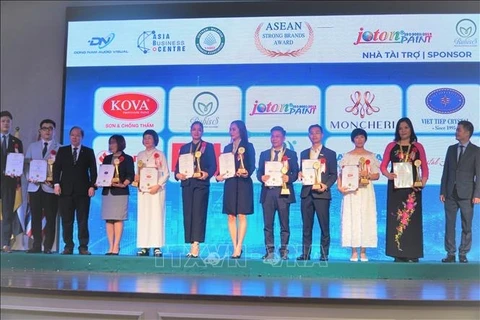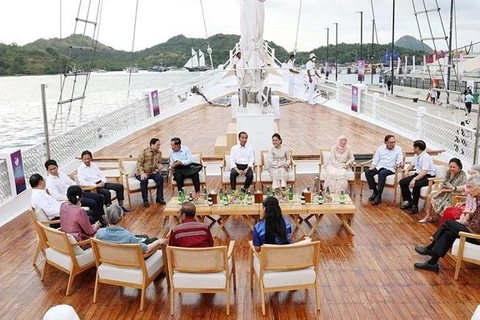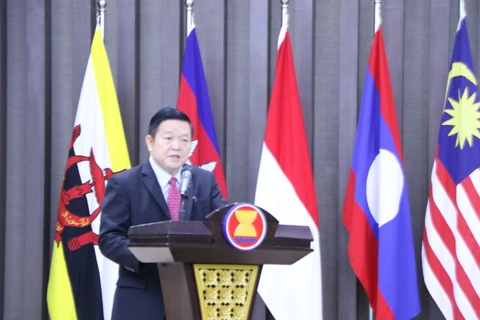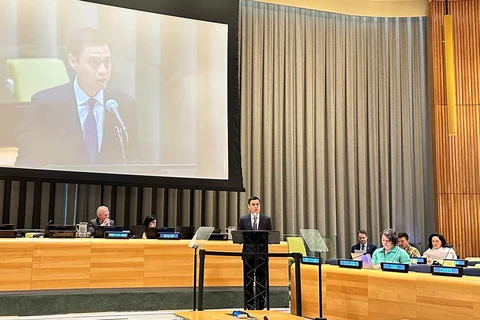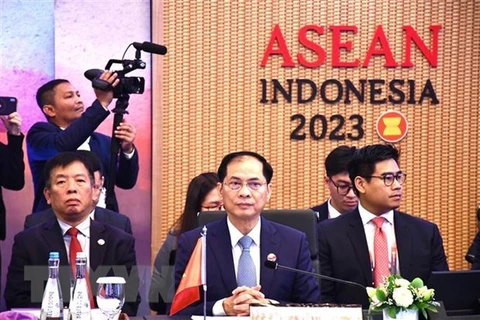 Prime Minister Pham Minh Chinh (the foutth from the left) and other ASEAN leaders attends the 42nd ASEAN Summit in Labuan Bajo, Indonesia, on May 11, 2023. (Photo: VNA)
Prime Minister Pham Minh Chinh (the foutth from the left) and other ASEAN leaders attends the 42nd ASEAN Summit in Labuan Bajo, Indonesia, on May 11, 2023. (Photo: VNA) Hai, who is an Adjunct Senior Lecturer of Policy and Politics at the School of Justice's Faculty of Creative Industries, Education and Social Justice, said that since 1995, Vietnam's position, role, voice and even influence in ASEAN have been increasing.
He attributed this to Vietnam's geostrategic position in the region, its strength and development over nearly 40 years of Doi moi (renewal), its foreign policy, its constructive and responsible approach, and its compliance with the association's regulations, especially the principle of “ASEAN Consensus”, and upholding international law.
 Dr. Nguyen Hong Hai, a lecturer of the Queensland University of Technology’s School of Justice. (Photo: VNA)
Dr. Nguyen Hong Hai, a lecturer of the Queensland University of Technology’s School of Justice. (Photo: VNA) From the very beginning, Vietnam participated in the development of and made important contributions to the birth of the 2007 ASEAN Charter which came into effect one year later. Principles underpinning the organisation's existence, peace, security and development in Southeast Asia, embodied in the Charter's provisions, were all contributed by Vietnam.
Vietnam has also made proposals and contributions to the building of the ASEAN Community which includes three pillars of ASEAN Political-Security Community, ASEAN Economic Community, and ASEAN Socio-Cultural Community.
During its tenures as ASEAN Chair, Vietnam launched many initiatives and successfully organised the association's activities, leaving a deep impression on ASEAN’s role, position and growth. Taking Vietnam’s 2010 ASEAN Chairmanship as an example, Hai stressed that Vietnam reached consensus on the decision to expand the East Asia Summit (EAS) with the participation of both Russia and the US. In the year, it also left a hallmark in working with ASEAN to overcome the COVID-19 pandemic.
The expert also mentioned Vietnam’s contributions to the approval of the ASEAN Outlook on the Indo-Pacific (AOIP) as well as its responsible but principled contributions in the spirit of the United Nations Charter and international law in resolving disputes and crises in the region, especially relations between ASEAN and China, and the East Sea issue.
Vietnam's contributions in this issue is, first and foremost, for the national interests, but its international law-based approach has contributed to ensuring and maintaining a Southeast Asian region, and a sea with sovereignty disputes but without armed conflicts, and maintaining peace for development. This approach is agreed and supported by all countries, Hai went on.
Vietnam has also made contributions in its role as ASEAN's coordinator with partners outside the region, contributing to consolidating and strengthening ASEAN's central role in international and regional affairs. As a non-permanent member of the UN Security Council for the 2009-2010 and 2020-2021 terms, Vietnam integrated regional issues into the council's agenda, helping raise the voice of the bloc at the UN peace and security forum.
Vietnam has also actively participated in solving non-traditional security issues, mainly through ASEAN mechanisms and those led by ASEAN, especially in the fight against terrorism and transnational crimes, cyber security, maritime security, rescue and humanitarian assistance, he added./.
VNA
